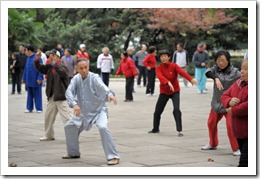Postmenopausal women with low bone density (osteopenia) but not osteoporosis were given green tea supplements for 6 months. A total of 171 women participated in the study in which there were four groups. Women in the placebo group and the placebo plus Tai chi groups received a total of 500 mg of a placebo per day. Women in the green tea and green tea with Tai chi groups received 500 mg per day of green tea polyphenols.
 Women in the placebo plus tai chi and the green tea plus Tai chi groups attended three 1 hour tai chi exercise classes each week for 6 months. Each session had a warm up and a cool down period with a routine of a 24 form Tai chi style that was repeated 6 times during the 45 minute training period. Women in the non Tai chi groups who took placebo or green tea capsules continued their customary activity levels throughout the 6 month study period.
Women in the placebo plus tai chi and the green tea plus Tai chi groups attended three 1 hour tai chi exercise classes each week for 6 months. Each session had a warm up and a cool down period with a routine of a 24 form Tai chi style that was repeated 6 times during the 45 minute training period. Women in the non Tai chi groups who took placebo or green tea capsules continued their customary activity levels throughout the 6 month study period.
Bone density testing, bone formation markers, bone loss markers, serum and urinary calcium, creatinine, parathyroid hormone and muscle strength assessments was done at baseline, 1,3 and 6 months.
Results: In this study, green tea supplementation and Tai Chi exercise increased bone formation biomarkers and improved bone turnover rate. Tai Chi exercise increased parathyroid hormone. Green tea supplementation, Tai Chi exercise and the combination of the two together all had an effect on improving muscle strength in these postmenopausal women with low bone density.
Comments: Previous animal studies have shown that green tea polyphenols can function via several mechanisms and therefore improves bone health. Collectively, these effects of green tea extracts improves muscle health, slows muscle aging, decreases muscle lipid oxidation, slows bone loss and increases bone formation. Other studies have also shown that Tai chi exercise improves muscle strength and endurance which may provide bone protection by improving the neuromuscular function. While the results of the current study are certainly a logic for including green tea supplementation and Tai chi exercise as a bone supportive strategy, a high quality long term study that includes the measurement of bone mineral density as a primary outcome would be necessary to really confirm the full benefits to addressing low bone density and/or preventing osteoporosis and/or preventing further bone loss.
Reference
Shen C-L, Chyu M-C, Yea JK, et al. Effect of green tea and Tai Chi on bone health in postmenopausal osteopenic women: a 6-month randomized placebo-controlled trial. Osteoporosis Int 2012;23:1541-1552.

